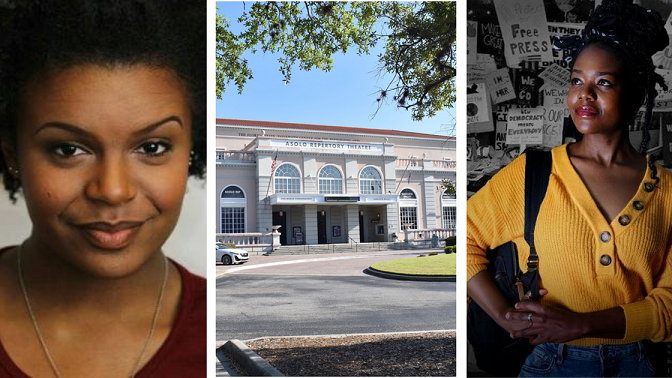Combating Institutional Racism: What we can learn from the students of the Asolo Conservatory for Actor Training
Irene Martinko
On June 12 of this year, a letter was sent to the FSU/Asolo Conservatory for Actor Training and the Asolo Repertory Theatre in Sarasota, Florida. In direct response to a Black Lives Matter statement made by the organizations in question on social media, a group of Conservatory students confronted the administration with stories and statistical examples of institutional racism. OnStage Blog’s original article about this action can be found here.
The complete letter, which can be read here, details, among other things, the lack of representation both onstage and on the faculty, the problematic way in which students are treated by those in leadership positions, and the shocking lack of Black-written plays taught in the curriculum and produced for the public.
For example, the letter reads, “Since the 1999-2000 season, the FSU/Asolo Conservatory has produced 91 plays in its production seasons. None of them were written by Black playwrights.”
It’s been over a month since the letter was published and now the question remains: What happens next? This past week, I had the opportunity to join Naire Poole and Bonita Jackson Turner, two of the five students who co-authored the letter, on Zoom to hear more about their experience.
I’ll begin by saying that the original intention of this article was to bring attention to their call to action. Because of the response, or lack thereof, from the Conservatory and Asolo Rep, it felt like their message wasn’t being heard or meaningfully engaged with. I am pleased to report that the day before our call, the Conservatory, along with representatives from FSU, finally held a meeting with the student authors to discuss the letter and to go over the development of a new anti-racist action plan.
Naire Poole
“I personally think it was a very successful meeting and I felt that there was a lot of listening happening. There wasn’t aggressive pushback,” said Naire. “It was nice to sit down and go point by point to give our feedback on the plan that they had drafted. And I felt like it was an excellent way of communicating with each other.”
I was pleased to hear that progress was made. It shows us that theatre companies and arts education programs can and should listen to those they are meant to serve. They have the ability to do the work and take the steps to create a better environment for those they employ and teach. But let’s look at what it took to get to this point.
Beginning with the crafting of the letter, it’s clear that the student authors had a lot of material to work with. Reaching out to Black Conservatory alumni all the way back to the class of ‘96, they received countless stories detailing a history of institutional racism.
“All of the stories were, for the most part, traumatic,” shared Bonita.
They then used these stories, along with statistics about the history of both the company and the conservatory to create a meaningful letter demanding change. The completed letter was then sent out to the FSU and Asolo community for support. Current students and faculty, alumni, and institutional and freelance theatre artists are among those that signed the letter, including the well-known playwright, Lynn Nottage, who is one of the 3 Black playwrights that the Asolo has produced over the past 21 years.
The letter now has 265 supporters and that number continues to grow. When asked about how it felt for the community to stand with them in support, Bonita said, “The most amazing thing in all of this is not feeling alone. We are so affirmed and validated.”
"It’s incredibly validating to have people stand beside us and say that this is not just their issue,” Continued Naire. “This is our issue. And we need to be a part of the initiative to fix it.”
When the letter was officially sent, it was FSU who responded to the students first. Over the past month, the Dean and the Chief Diversity Officer have been in communication with the student authors and they have then taken the concerns of those students and passed them along to Conservatory leadership.
“It’s kind of dragging where it can get to a point where we can enter a room with everyone,” said Bonita. “It’s been really discouraging and disheartening and leaves us in limbo because we’re still students and we have to go back.”
“I really had a fear that we had reached a stalemate,” Added Naire. “We are getting a separation and not as much confrontation is happening, but there is a great deal of relaying that is happening. To take this long is purely a dragging feat.”
The lack of response from the Conservatory caused students to feel that their message wasn’t being heard or being taken seriously. Continuing the fight, the authors once again reached out to the allies in their community.
“We brought allies in who went to bat with us immediately,” Said Naire.
Bonita continued, “The only reason we got the meeting yesterday was because we were asking and because our community was asking. The outrage from the entire student body was so fierce and it’s so wonderful to have that type of backing not just from the Black students and students of color but from our white cohorts.”
Bonita Jackson Turner in ‘The Niceties’ at Urbanite Theatre
It was because of this overwhelming support that the Conservatory and FSU are working on an anti-racist plan to put into practice. And it was because of the letter, in which clear actionable steps were written out that this plan has a meaningful structure.
What still needs to be done? It’s clear that the Conservatory needs to continue to work directly with the students to make meaningful change, and it's also clear that they still have a lot of work to do. But even more importantly, it is now up to Asolo Repertory Theatre to commit to making meaningful change as well.
Though the Conservatory is deeply connected to the Asolo, this regional theatre goes far beyond the scope of FSU. They must develop their own action plan in order to respond to the equity and diversity needs outside of the Conservatory program.
“They are a regional theatre. They are a LORT theater. They are not beholden to FSU’s policies and procedures,” Bonita said when discussing the next steps. “It’s kind of lazy to lean on FSU’s antiracist plan. If they did, it would not address the severe racial prejudices.”
Naire continued, “Because we are so intimately engaged with Asolo Rep, they’ve been roped into the issue. Even if we were not part of their theatre, the issue would still be there. The need to change would still be there. They have work that needs to be done.”
So what can we learn from all of this? Well, it’s clear that Black theatre artists have to fight to be heard and that arts organizations can always do more to make change happen and to open their lines of communication. It’s also clear that allies have tremendous power and an obligation to support those in their community who need to be heard. It is by doing our own antiracist work and fighting for those who already have to spend so much time advocating for themselves that we can help to combat institutional racism.
It is also crucial that theatre companies and educational programs across the country develop their own anti-racist plans whether they have been called to do so or not. They must listen to those that they serve and take some serious steps to create supportive, safe, and inclusive environments.
”Black students and students of color around this nation need to not just have words submitted to them, but have actions done,” Bonita concluded. “And the community needs to stand with us to hold these white institutions to account. If we aren’t all together in this moral outcry the structures will fall back on what the status quo has been.”


